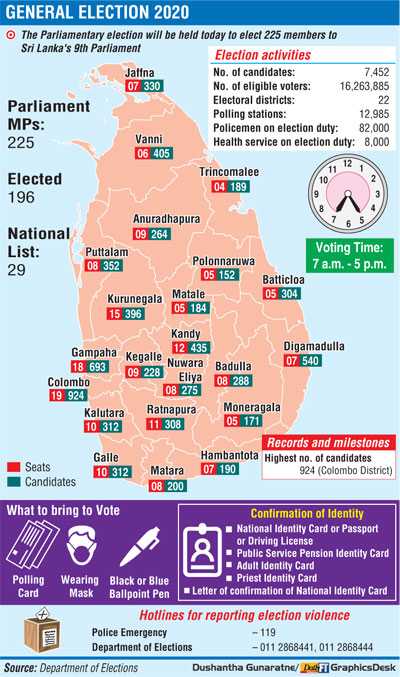Thursday Feb 19, 2026
Thursday Feb 19, 2026
Wednesday, 5 August 2020 03:43 - - {{hitsCtrl.values.hits}}
By Chandani Kirinde
 Millions of Sri Lankans will go to the polls today to elect members to Sri Lanka’s Ninth Parliament, after an election campaign eclipsed by the outbreak of COVID-19.
Millions of Sri Lankans will go to the polls today to elect members to Sri Lanka’s Ninth Parliament, after an election campaign eclipsed by the outbreak of COVID-19.
Polls will open at 7.00 a.m. with strict health guidelines in place to minimise the risk of the spread of COVID-19 on Election Day. The poll will close at 5.00 p.m., an hour later than usual on voting days, allowing people more time to vote, while complying with health rules such as maintaining social distancing and sanitising hands at polling booths.
Over 200,000 public officials and around 69,000 Police personnel will be on election duty at 12,985 polling stations across the country.
An additional 10,000 health sector workers have been deployed to ensure that the health guidelines are adhered to during the election and at counting centres.
The election will be monitored by local personnel, due to the inability of foreign election monitors to travel to the country due to the COVID-19 related restrictions in place.
A total of 7,452 candidates are vying for a seat in the 225-member Parliament, with 3,652 contesting from political parties and another 3,800 from independent groups. In 2015, a total of 6,151 candidates contested.
One hundred and ninety-six (196) Members of Parliament (MPs) will be directly elected from the 25 districts to the Legislature, while 29 will be appointed from the National List.
A total of 16,263,885 are eligible to vote at this year’s Parliamentary Election, about 270,000 more than those who were registered to vote at last November’s Presidential Poll. The 2019 electoral list will be used for the election, while for November’s Presidential Poll, the 2018 list was used.
Election Commission Chairman Mahinda Deshapriya said he expects a turnout of over 75%, despite fears over COVID-19. Nearly 84 % of registered voters cast their votes in last November’s Presidential Election, but this is likely to drop due to the ongoing public health issue.
Counting of ballot papers will commence at 7.00 a.m. tomorrow, unlike in previous years, where counting commenced a few hours after the polls closed. This measure has been introduced in keeping with the COVID-19 situation in the country.
Today’s election comes after two previous failed attempts to hold the poll, namely on 25 April and on 20 June, due to the increase in the number of COVID-9 patients in the country.
The decision to hold the election in August was announced after health authorities gave the go-ahead for the poll with strict adherence to health regulations by candidates, their supporters, and election officials.
The Sri Lanka Podujana Peramuna (SLPP), led by President Gotabaya Rajapaksa, which is facing its first Parliamentary Election, is expected to secure a comfortable victory but fall short of the two-third majority that the Party campaigned for.
The SLPP is pitted against a weakened Opposition, with the United National Party (UNP), the largest Party in the last Parliament, split in two and contesting separately, with former Prime Minister Ranil Wickremasinghe leading the UNP, and Sajith Premadasa leading the breakaway faction, the Samagi Jana Balawegaya (SJB).
Two former Presidents, Mahinda Rajapaksa and Maithripala Sirisena, are vying for a parliamentary seat, with the former contesting from the Kurunegala District, and the latter from the Polonnaruwa District.
President Gotabaya Rajapaksa dissolved Parliament on 2 March, after the last Parliament completed four-and-a-half years of its five-year term, under powers vested in him under Article 70 of the Constitution, and under the provisions of the Parliamentary Elections Act No. 1 of 1981. The President is empowered to dissolve Parliament only after the completion of four-and-a-half years, after the enactment of the 19th Amendment to the Constitution.
Nominations for the poll were received between 12-19 March.
The 2015 General Election was held on 17 August, in which the United National Party (UNP) won 106 seats in the Legislature, while the United People’s Freedom Alliance (UPFA) won 95 seats.
The Illankai Tamil Arasu Kachchi (ITAK) won 16 seats, the People’s Liberation Front (JVP) won six seats, while the Eelam People’s Democratic Party (EPDP) and the Sri Lanka Muslim Congress (SLMC) won one seat each.
The 2015 General Election was the first to be held after the enactment of the 19th Amendment to the Constitution, which saw the term of Parliament reduced from six years to five years.
Today’s election will be the costliest to be held in the country, with the Election Commission estimating the bill to be around Rs. 10 billion due to additional expenses incurred to put COVID-19 preventive measures in place.
